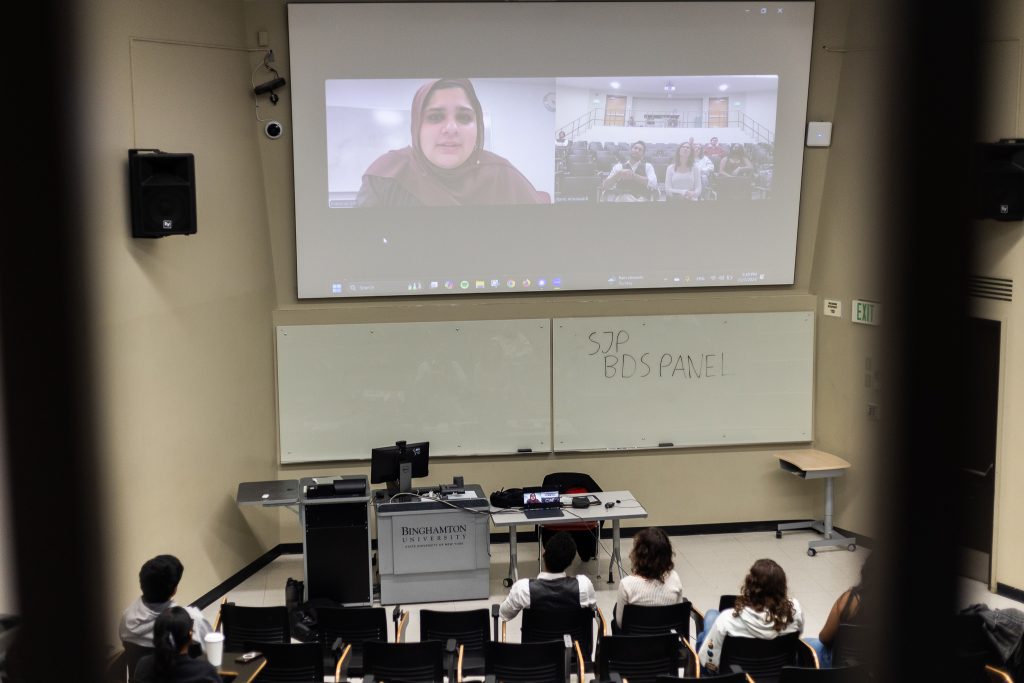The Students for Justice in Palestine collaborated with their national organization to hold a panel discussion about the Boycott, Divestment, Sanctions movement.
The event, held in the Lecture Hall last Thursday, featured a speaker from the national SJP organization, and students asked questions about BDS on college campuses. During their time as a Rutgers University undergraduate, the speaker, who remained anonymous, was part of a larger effort seeking divestment from “fossil fuels, apartheid, [the] military-industrial complex [and the] prison industrial complex.” Rutgers agreed only to divest from fossil fuels, they said.
“The Zionist oppression of SA Congress has made students feel unheard, neglected, and extremely isolated,” SJP wrote to Pipe Dream, referring to the Student Association’s legislative branch. “Knowing that we are an integral part of a much larger and more powerful movement is remotivating and comforting to those who refuse to stop fighting for divestment and the freedom of the Palestinian people from apartheid.”
The session began with introductions by SJP representatives, who discussed the SA Congress’ Oct. 8 vote to rescind last semester’s BDS resolution. The SA Congress then passed five of six new pieces of legislation — parts of which were later struck down by the SA’s Judicial Board. One resolution to prevent outside organizations from co-sponsoring legislation was proposed and then tabled for the next meeting.
“Regarding the current SA situation, we do not believe that the SA Congress is a properly representative congress of Binghamton University,” SJP wrote. “Our current Congress is severely lacking in diversity and has shown themselves to be unable to put their personal political agendas aside to truly reflect the will of the student population. Last year’s resolution passed with the support of 20+ multicultural organizations — none of these organizations are currently represented in Congress.”
The stated mission of National SJP is to support student activists across North America advocating for Palestinians. The organization’s values center around collective liberation, acknowledging the interconnected nature of global systems of oppression.
The National SJP representative emphasized divestment as a tool “to materially impact the occupation in the imperial core at a university.” They listed the resources the organization offers to students, like analysis of current events, connections between chapters facing similar struggles and providing chapters with relevant support resources.
After a question about the factors contributing to a successful divestment campaign, the speaker highlighted the importance of taking incremental steps, as challenging larger institutions — public or private — is a long-term process.
“South African apartheid divestment did not come overnight,” the speaker said. “And so sometimes we find ourselves in cycles of, ‘Why isn’t divestment happening?’ It’s hard, it’s long, we’re challenging a really aggressive force, a repressive force. And so I think really, for us when we’re analyzing when we really understand the university context, when we go into a chat with a chapter — what makes sense to be an incremental goal for y’all? And then we measure success by those goals.”
The speaker described different methods of divestment, including academic boycotts and broader campaigns, like their efforts at Rutgers. They discussed smaller campaigns, like those requiring that SA funds not be used for military efforts and boycotting companies with ties to the Israeli military, and their potential as “first steps” toward divestment. The speaker urged students to find creative ways to organize divestment campaigns.
Divestment efforts in Canada were mentioned in relation to proposing socially acceptable investments to the boards of trustees in the hope of replacing boycott targets. The representative described the existing infrastructure that exists for ethical divestment and the ways in which students can use this framework — along with a strong support system — to further BDS.
“I think the Canada chapter made a full 20-page document where they were just, like, this is what you say is happening,” they said. “This is what’s actually happening. Here we have facts to prove it. This is what you should be doing instead. And so a lot of it is literally sharpening your toolbox and how to argue with them.”
SJP shared its goals for the event, writing, “We hope that attendees took away a new sense of hope, unity, and belonging in this large and powerful movement for human rights nationwide.”
“Despite the nationwide move towards fascism and Christian Zionist nationalism, we at SJP remain committed to the goals of human rights and anti-fascism for the United States and the world,” they added.



